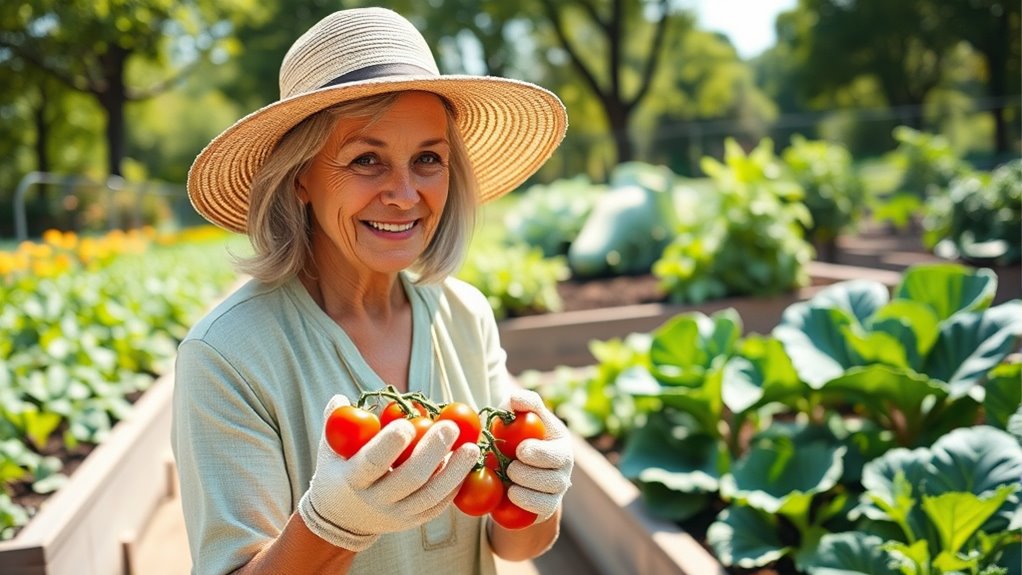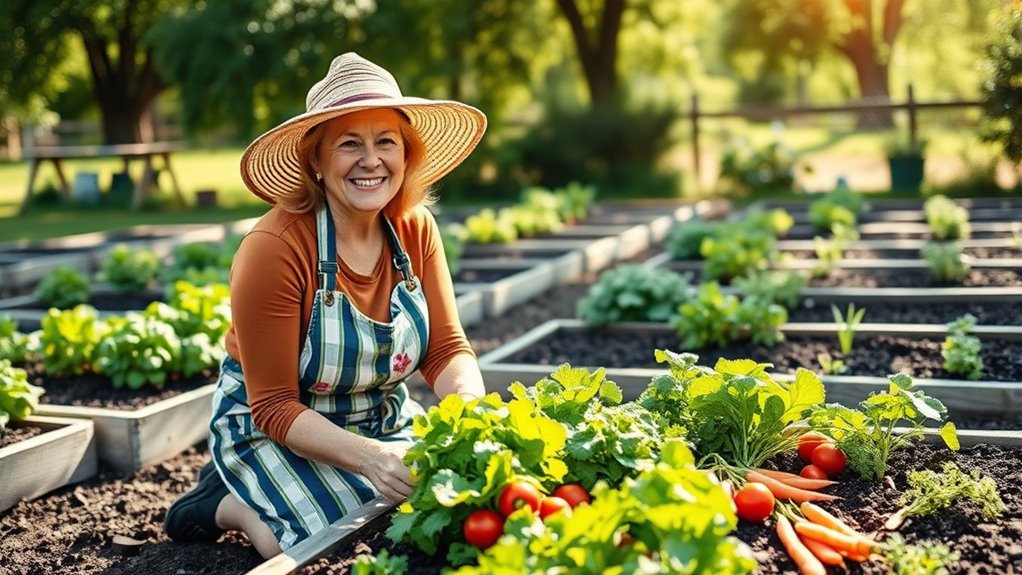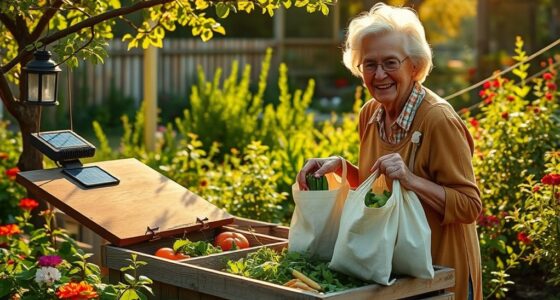Growing your own vegetables is simple and rewarding when you use easy watering methods like drip irrigation or soaker hoses, and keep the soil healthy with mulch and organic matter. Water early in the day and check soil moisture regularly to prevent stress. Practicing mindful gardening and maintaining a routine can boost your well-being while nurturing your garden. Keep exploring these simple tips to make your vegetable garden a joyful, sustainable activity.
Key Takeaways
- Choose low-maintenance vegetables like lettuce, radishes, and herbs that thrive with minimal effort.
- Use raised beds or container gardening to reduce bending and make planting easier.
- Implement simple watering systems like drip irrigation or soaker hoses to conserve time and effort.
- Mulch around plants to retain moisture, reduce watering, and minimize weeding.
- Practice mindful gardening routines to enhance enjoyment and maintain consistent care with less physical strain.

Have you ever wondered how to enjoy fresh vegetables without the hassle of a demanding garden? Gardening can seem overwhelming at first, especially if you’re concerned about maintaining it or dealing with pests. But with the right approach, growing your own vegetables can be simple, rewarding, and even therapeutic. One of the key aspects to keeping your garden easy and productive is mastering watering techniques. You don’t need complex systems—just a consistent routine that keeps your plants healthy. Early in the day or late in the afternoon are the best times to water, avoiding the heat of midday to prevent evaporation and stress on your plants. Using a soaker hose or drip irrigation can make watering more efficient, delivering moisture directly to the roots while reducing waste and minimizing the effort required. Check the soil regularly—if it feels dry about an inch below the surface, it’s time to water again. Mulching around your plants helps retain moisture, reduces the frequency of watering, and keeps weeds at bay. These simple watering techniques help prevent overwatering or underwatering, which can weaken plants or invite pests. Additionally, understanding nutrient retention like how raw foods preserve natural enzymes can help you maintain healthy skin while gardening, especially when exposed to the sun. Being aware of soil health can also improve your garden’s productivity and resilience over time. Incorporating organic matter into your soil can further enhance its fertility and structure, supporting your vegetable plants’ growth. Moreover, practicing mindfulness during gardening can enhance your overall well-being and enjoyment of this rewarding activity.
Frequently Asked Questions
What Are the Best Vegetables for Small Garden Spaces?
If you’re working with limited space, choose vegetables suited for small gardens, like lettuce, radishes, and cherry tomatoes. You can maximize your space through container gardening and companion planting, which helps improve growth and ward off pests. These methods allow you to grow a variety of vegetables in tight spots, making gardening easier and more productive, especially if you prefer low-maintenance options that thrive in small areas.
How Can Seniors Prevent Back Strain While Gardening?
Imagine your back aching after just a few minutes of gardening—that’s preventable. You can avoid this by using ergonomic tools designed to reduce strain and practicing proper lifting techniques. These simple adjustments keep your back safe and make gardening enjoyable. Before bending or lifting, plan your moves carefully, engage your core, and use tools that minimize discomfort. Stay mindful, and you’ll nurture your garden without risking your back.
What Tools Are Easiest for Seniors to Use?
When choosing tools, you want ergonomic tools and lightweight gardening equipment that make gardening easier. Look for tools with padded handles, adjustable lengths, and cushioned grips to reduce strain. These features help you maintain good posture and prevent fatigue. Using ergonomic tools guarantees you can work comfortably for longer periods, making gardening safer and more enjoyable. Always select tools designed with seniors in mind for the best experience.
How Often Should I Water My Vegetable Garden?
Think of your garden as a thirsty soul craving gentle, consistent attention. You should water your vegetables deeply once a day, preferably in the early morning, to keep the roots moist and healthy. During drought conditions, increase your watering schedule to ensure plants don’t wilt. Keep an eye on soil moisture, and avoid overwatering, which can drown roots. Balance is key to nurturing your garden’s vibrant life.
Are There Specific Pests Common in Senior Gardens?
You might notice common pests like aphids, slugs, or beetles in your garden. To protect your plants, consider using pest resistant plants and natural pest control methods, such as introducing beneficial insects or applying neem oil. Regularly check your garden for signs of pests and remove them by hand if needed. Keeping your garden clean and healthy also helps prevent pest problems, making your gardening experience more enjoyable.
Conclusion
Now that you’ve learned simple steps to start your vegetable garden, you’re set to sow seeds of success. Embrace the ease, enjoy the excitement, and experience the energy of growing your own greens. Gardening grants you growth, gratitude, and a great way to stay active. So, seize the season, savor the satisfaction, and let your gardening journey grow grandly. Your green thumb awaits—go ahead and get your garden glowing!









